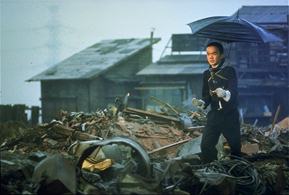

Japan drama
1970
color 140 min.
Director: Akira Kurosawa
CLV: $69.95 - available
2 discs, catalog # CC1443L
VHS: available from Home Vision Cinema

Dodes'ka-den was made at a low point in Akira Kurosawa's long career-perhaps the lowest that the director
has ever known. In the preface of the filmmaker's autobiography, critic and translator Audie Bock reports
that Kurosawa's commercial prospects became bleak in the late '60s after he backed out-amid controversy-of the
directing the Japanese portion of the Hollywood coproduction Tora Tora Tora. Dodes'ka-den was his
next film, made on a low budget, with financing put together by his friends.
Interviewed for a Japan Society monograph on his work, Kurosawa said, "If you were to ask me
what sort of mood I was in when I directed this picture, I think I'd have to say I was emotionally
drained." So emotionally drained, in fact, that he attempted suicide after its completion.
Kurosawa's work had already encompassed many styles and influences: from the chambera, or "sword theater" tradition
(which he so stunningly altered with American Western conventions); to the detective thriller; to Western literary
adaptations, including works by Shakespeare and Dostoyevsky. His film directing prior to Dodes'ka-den had been
the gripping, compassionate Red Beard, which famed Japanese film historian Donald Richie in The Films of Akira
Kurosawa considered a summing up and completion of Kurosawa's humanist philosophy. Richie writes, "He had pushed his style
to what appeared to be its ultimate." Red Beard was also a great box office success, crowning Kurosawa's long line of
triumphs-a hard act to follow.
Stylistically, Dodes'ka-den represented a dramatic departure from Kurosawa's other films. Not only is it his first film
in color, but it is a work of startling artificiality, divided into vignettes set in a squatters community in the midst of what
appears to be a garbage dump or landfill. Kurosawa abandons the dynamic drive particular to the storytelling of his earlier films,
especially those starring Toshiro Mifune, for a calm unfolding, in which a delicate sense of wonder plays a large part. In its almost
childlike approach to demonstrating the proclivities of human nature, as a veritable human comedy, Dodes'ka-den marks the beginning of a
method that characterizes the films of Kurosawa's old age.
The title Dodes'ka-den is an onomatopoeia for the sound a trolley car makes (something like "clickety-clack" in English) as it is
imitated by a young man whose daily route through the rubble-strewn landscape provides a continuity for all the separate threads of
story. The film's contrasting emotions are already represented in his story, from the terminal sorrow of his mother-who, in a room
papered with his splashy crayon drawings, watches her addled son meticulously prepare for his "job" driving the imaginary trolley car-to
the low-key comedy that attends his thoroughly serious pantomime.
The characters Kurosawa sketches are complex human mechanisms who are all hiding secrets. They include the dapper, palsied Mr. Shima
and his slovenly wife; the teenages Katsuko, who makes artificial flowers to support her ailing aunt and self-centered uncle; a zombielike
man whose unfaithful wife left him; a ragamuffin dreamer and his stoic little son, who live in an abandoned car; and a pair of feuding couples
who periodically trade partners. "Trolley" represents only the most innocent of the obsessions Kurosawa brings to light in his microcosm, for he
focuses on the foolishness and greed, selfishness and self-absorption until the seeds of all things, good and bad, come to fruition. The film is
radically stylized, with brilliant false colors, expressionistic lighting, special effects, and bizarre makeup. Kurosawa cuts loose visually when treating
the characters least anchored in reality. Thus, garish skies and painted backdrops provide "Trolley's" journey with its own remote realm. The most extreme visuals
are reserved for the homeless father and son, who dull the pain of their lives with the progressive construction of an imaginary dream house, which
Kurosawa sets shimmering on the horizon with matte paintings. As their situation becomes dire through pigheadedness and folley, the two are rendered grotesque
caricatures with wild, masklike faces.
Dodes'ka-den is shockingly cheerful in its observations. , touchingly matter-of-fact in its acceptance of human nature and all its contradictions.
Kurosawa crafts a world that is magicalbut not happy, one in which the mystery of the imagination and the ugliness of the inevitability equally hold sway. Dodes'ka-den
is neither a cynical nor hopeless film, but its characters unfailingly reap what they sow, often to cruel effect. The director's celebrated humanism not only remains intact,
but manifests itself in yet a more naked and fragile form, risking the ridicule that attends change.
--Barbara Scharres
Transfer
Dodes'kaden is presented in the aspect ratio of 1.66:1. This new digital film-to-tape transfer was created from a new 35mm composite print.
Telecine operator: Chris Ryan/Manhattan Transfer, NYC
Supervised by Lee Kline
Subtitles by Levana Skhedi/Modern Videofilm, Los Angeles




